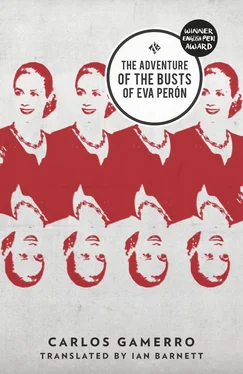He hadn’t run into any of the Montoneros Miguel had sent for, but that came as no surprise: professionals of their standing wouldn’t let themselves be spotted that easily. But the exception proves the rule, Marroné confirmed yet again as he crossed the entrance to the right transept and made out a figure beyond the green machines, sitting with its back to him under one of the many lights that hung from the roof, orbited by insects. It was one of the two girls, he found out as he approached stealthily and saw her long, chestnut hair tumbling loose down her back. As he walked around her, he discovered what it was that had her so engrossed: on her lap lay an open book. In his surprise — she was the first reader he’d come across since he’d arrived — he must have made a noise, for a second later the girl had dropped the book with a startled shout and was pointing her FAL straight at his head. But this wasn’t what left Marroné paralysed and open-mouthed; it was the face of the young woman now staring into his, her eyes bulging with fright. Marroné had recognised her immediately. It was Eva. She too seemed to recognise him, because she instantly lowered her gun and saluted.
‘Forgive me.’
Marroné said the first thing that came into his head.
‘At ease, comrade.’ He pointed to the fallen book. ‘Reading, are we?’
Impulsively Eva made to grab it, but Marroné stopped her with a chivalrous palm and crouched to pick it up. It was a paperback with a fuchsia-pink cover, from the base of which rose a forest of raised hands, two or three with open palms, but most with index fingers pointing upwards; Marroné’s almost physical sensation of discomfort was so intense that he couldn’t help glancing at Eva’s face to see if she had noticed. But she only seemed concerned about the book, whose predictable title, The Wretched of the Earth , meant nothing to him, even though the name of its author, Frantz Fanon, was vaguely familiar. Out of sheer curiosity he opened it at random.
‘Please can I have it back?’ begged Eva, holding out her hand. ‘I swear it won’t happen again…’
‘Don’t worry,’ Marroné said, all condescension and bonhomie. ‘Guard duty can get pretty tedious, I know. But I don’t need to tell you what could have happened if it had been the enemy instead of me.’
She nodded contritely, brushing the hair from her face. There was no doubt about it: she was the Eva in the photonovel and, with her light-brown hair down like that, she reminded him especially of the young woman posing cheerfully in her polka-dot bathing costume: he would have liked to make her laugh, see her smile again, this time in the flesh.
‘What’s your name?’ he asked her.
‘María Eva,’ she answered, after a slight hesitation.
Of course, thought Marroné. It was her nom de guerre , obviously, and it would have to do, because a guerrilla leader would never ask for her real one.
‘So María Eva’s a reader, is she?’ he said in a tone that was trying to be pleasant but, he realised too late, made him sound like a secondary-school teacher ticking her off. ‘Don’t worry,’ he hastened to correct it. ‘We’ll keep it just between you and me this time. I’m an avid reader too, I read whenever I can, even on the… er… the bus,’ he said, nimbly negotiating the hurdle he had inadvertently set himself. ‘May I?’ he said, opening up the book at random and starting to read:
To begin with, the impossibility of going up to a woman, the risk of never seeing her again another day, suddenly lend her the same charm as illness or poverty will to a place they prevent us from visiting, or the fray in which we shall surely die to the dull days we have still to live. So that, were it not for habit, life should seem delicious to those people who may at every hour be in danger of dying — all mankind, that is. Then, though the imagination is carried away by the desire for something we cannot possess, its flight is not held back by a reality fully perceived, in these chance meetings in which the charm of the passer-by generally stands in direct proportion to their briskness. The night may fall and the coach go fast, in the country, in a town, but there is no female torso, mutilated like an ancient marble by the speed which draws us on and the dusk which shrouds it, that, at every corner of the road, in the depths of every lighted shop, does not fire Beauty’s arrows at our heart — Beauty, which tempts one to wonder at times if it is anything in this world but a makeweight added by our imagination, overwrought as it is by regret, to the fleeting and fragmentary shadow of a woman passing by.
In his astonishment Marroné checked the top of the page: In the Shadow of Young Girls in Bloom . Intrigued, he looked at the first page: 127. Then he clicked: what he was holding was a fragment of a larger work, torn from the original and stuck inside another book’s cover.
‘Please, don’t tell my superior,’ he heard María Eva’s voice say. ‘Last time he caught me reading Proust, he made me write a self-criticism. If he finds out I’ve lapsed again…’
‘So that’s why you hid it inside the Fanon, is it?’ he asked with a smile.
María Eva flashed him a smile, at once shy and impish. The first. She was definitely the Eva in the photonovel. But he decided to wait until they were on closer terms, before he asked her.
‘So, do you like him?’
‘Fanon? Well, sure, he’s right about everything he says, of course: the culture of the coloniser and the colonised, right? Of course, the situation in Africa’s a bit different from ours… I mean, when he wrote it, they really were colonies…’
‘No, Proust,’ he cut her short.
She spoke quickly, almost apologetically, as if ashamed of her own enthusiasm.
‘Aaaah. Sure! Well, I mean, he’s a real bourgeois; no, if only, not even a bourgeois; he’s an out-and-out oligarch: all those princesses and marquises, and their residences… They’re all such snobs… It’s almost embarrassing at times. You’d think there’d never been a revolution in France. And he’s sooo European… I know the comrades gave me funny looks when they found out, but I dunno, it’s kind of like a vice… And there are other things about him… his relationship with his mother — wanting her to tuck him in and all that, and Swann’s love for Odette, and the walks around Méséglise and Guermantes… You’re reading and suddenly you’re there, in the countryside… Oh, I’m sorry… I’m talking as if everyone had read him. That’s so rude of me, I’m always doing that. Comrade, have you ever…?’
‘Please, call me Ernesto,’ he reassured her, desperately scrabbling in his memory for scraps of information about Proust: he’d written In Search of Lost Time ; there were several volumes; and it had something to do with memories… But, as far as he knew, there wasn’t a single business title along the lines of In Search of Lost Profits or In the Shadow of Young Markets in Bloom .
‘No, I can never find the time for things like that,’ he quipped. ‘As you know, being an officer isn’t a part-time… er… But you have to take a break occasionally, don’t you. You can’t be reading Marx and Lenin and Mao all the time, now, can you. At the moment, for example, I’m reading…’ He took a breath before saying, ‘ Don Quixote .’
This time he was rewarded with the full, radiant, eternal smile of the photo.
‘I don’t believe it. I finished it a couple of months ago. I can still remember the day. Oh, when he died all huddled up and shrivelled like that, it made me feel so sad… I wept like a little girl.’
Marroné looked at her sternly.
‘Now you’ve told me how it ends.’
Читать дальше











